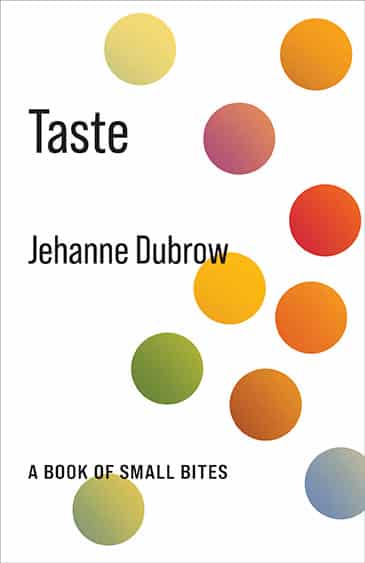 Photo by Cedric Terrell
Photo by Cedric Terrell “Taste and scent are linked physically,” Jehanne Dubrow, author of “Taste: A Book of Small Bites,” told the Journal.
“Taste and scent work together in particular to tap into the part of the brain where we access memory and emotion,” she said. “It’s linked to feeling and to a sense of personal identity.”
It was a book on smell that led to this latest book by Dubrow, author of nine poetry collections and professor of creative writing at the University of North Texas
“I had written a book of nonfiction called “throughsmoke: an essay in notes,” which was about how I came to fall in love with the sense of smell and especially with perfume.
The editors of a philosophical series, called “No Limits,” published by Columbia University Press, contacted her to see if she would like to write a philosophical meditation on scent. Since she had already written her “smelly” book, Dubrow, who had been thinking a lot about food and taste, proposed a book that examined philosophically the meaning of taste.
 “Taste” is divided into five sections, focusing on the five known tastes, sweet, sour, salty, bitter and umami. Within each of those sections are tiny essays, just like small bites. ”Taste” considers the ways that we ingest the world, how we come to know ourselves and others through the daily act of tasting.
“Taste” is divided into five sections, focusing on the five known tastes, sweet, sour, salty, bitter and umami. Within each of those sections are tiny essays, just like small bites. ”Taste” considers the ways that we ingest the world, how we come to know ourselves and others through the daily act of tasting.
“We are so often shaped by the things we’ve eaten in our lives,” Dubrow said. “We’ve all had those Proustian experiences where we taste something and Instantly we’re taken back to a moment that we’ve forgotten about up until that time.”
She continues, “I love that food can do that; so often if you’re missing somebody maybe you’ll eat something that reminds you of that person.”
Dubrow shares how her paternal grandmother was a gifted baker, and her emotional connection to it.
“Like a lot of German Jews of her time, she was sent in preparation for being a good hausfrau to Austria to learn how to bake,” she said. “My grandmother made an incredible Sachertorte, which is Vienna’s most famous cake.”
It’s a dense, rich chocolate cake with layers of apricot jam and a very smooth ganache.
“When she died, she left my father the recipe for her Sachertorte, but she didn’t leave the recipe for the icing, because it was so much a part of her that she didn’t need a recipe for the icing,” Dubrow said. “My father spent the next ten years trying every chocolate ganache recipe he could find to recreate the perfect icing.”
He eventually found the recipe that almost perfectly recreated it.
“Now, of course, I associate it not only with my grandmother who died when I was eight years old, but with my father’s love, and by extension with her love,” she said.
Dubrow says her own food contribution to Jewish culture is what she calls the Matzah Bromelette. This is a cross between an omelet and matzo brei, and it’s very easy to make. The recipe is below.
“It’s a delicious combination of sweet and savory,” she said. “For me it tastes more filling and more satisfying than your traditional matzo brei.”
Another reason she loves it is that you can enjoy it for breakfast, lunch or dinner.
While Dubrow believes meals are communal experiences, for 14 years of her marriage, she was frequently cooking and eating alone; her husband was active duty military, and often deployed.
“All of us at some point in our lives … find ourselves alone for one reason or another,” she said. “Maybe it is an interesting challenge to think, ‘How do I find a way to enjoy tasting and the pleasures of good food when it’s just me and I’m all by myself?”
When you’re cooking for yourself it not only can become a little lonely, it’s very easy to get bored of what you’re making.
“I love to take myself out for a meal,” she said. “Then, if I have something that I really love, I try to recreate it or take one of those tastes that I fell in love with and see if I can incorporate it at home.”
For example, Dubrow recently went to a Turkish restaurant and loved the pomegranate reduction they put on one of the mezes (small plates).
“I went home and thought, ‘How can I use a pomegranate reduction?’” she said. “Just thinking in that way – about like tastes that you’ve discovered and ways to incorporate them into your own cooking, even if you’re not doing it in the way that you originally encountered this taste – can be reinvigorating.”
She adds, “Just as with smell, I think with taste, we’re always looking for new, new things to discover and ways to surprise ourselves.”
Learn more at JehanneDubrow.com.
For the full conversation, listen to the podcast:
The Matzah Bromelette
The matzah bromelette combines the comforting solidity of matzah brei with the fluffiness of an omelette. It’s the perfect anytime meal and is delicious all year round (not just during Pesach!).
Makes 1 serving
1 sheet of matzah
2 large eggs
1 tablespoon vegan milk (I use almond milk)
A pinch of apple pie spice (or a generous sprinkle of cinnamon)
Kosher salt and freshly ground white pepper
1 tablespoon olive oil
1-2 tablespoons maple syrup
½ cup of slice strawberries
- Break the matzah into ½-inch pieces and set aside.
- In a medium bowl, beat the eggs and milk lightly with a fork. Season with apple pie spice, salt, and white pepper. Gently stir in the matzah pieces.
- In a 9-inch skillet, heat the olive oil over medium-low heat.
- When the oil is hot, carefully add the egg mixture by the spoonful until it fills the whole pan.
- Keep the temperature low when cooking your bromlette, so that eggs cook slowly. Once the egg mixture has set and the bottom is perfectly golden brown (approximately 5 minutes), flip it over and cook the other side (approximately 2 more minutes).
- Serve the matzah bromelette topped with sliced strawberries and a generous drizzle of maple syrup.
Note: The matzah bromelette can be made savory by replacing the apple pie spice with a dash of smoked paprika. Instead of maple syrup and sliced strawberries, top the dish with salsa or perhaps a spoonful of ratatouille and some crumbled chèvre.
Debra Eckerling is a writer for the Jewish Journal and the host of “Taste Buds with Deb.” Subscribe on YouTube or your favorite podcast platform. Email Debra: tastebuds@jewishjournal.com.























 More news and opinions than at a Shabbat dinner, right in your inbox.
More news and opinions than at a Shabbat dinner, right in your inbox.